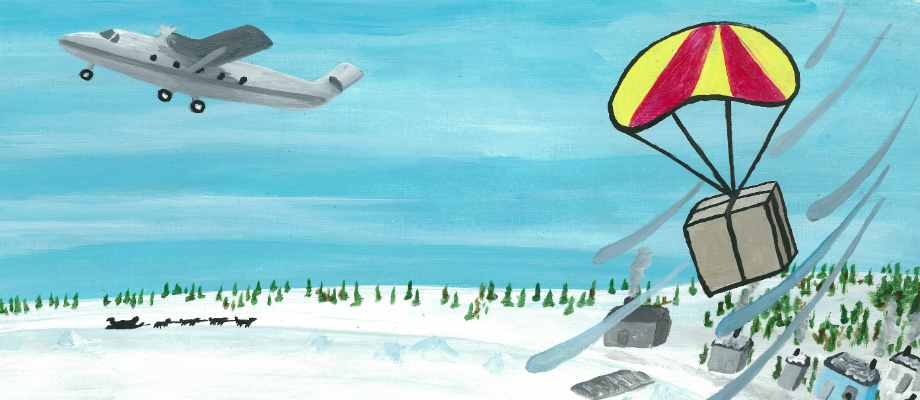 Expressing Identity
Expressing Identity
The Story of Inukbook
December 2017
Guest post by: Martha MacDonald, Associate Director, Labrador Institute
The first product of the Inukbook project is about to arrive under your tree just in time for Christmas, or at least by Nalajuk Night!
A children’s story written by Samantha Jacque, illustrated by Jessica Winters and inspired by a story told by Aunt Nellie Winters is the culmination of a process that brought together a committee of participants from Nunatsiavut and Memorial to produce the first book in what we hope will be a long series, published in Inuttitut and English.
The idea for Inukbook was simple and strong, like many good ideas; to make the learning of Inuttitut progress, books with local appeal are needed. The supply of children’s books in the language is limited, so providing our own was a natural progression for Nunatsiavut, where creating local solutions is a time-honoured response to challenges.
The committee represents speakers and teachers, NG and Memorial staff, a student, an artist, and a linguist, each contributing her abilities to the project.
Once decisions were made on the process of searching for suitable stories, the call went out to the communities, and people all over began demonstrating what we expected: so many people have a story to share.
The committee had to choose amongst several good selections, all of which will be kept to consider for the next volume in the project. This time, it was Samantha’s story of a little girl’s Christmas wish, inspired by Aunt Nellie’s account of a memorable childhood incident, that captured the attention of the committee. Everyone contributed editorial comments, shaping the story into the version we now have, and it was then sent out in a competition to find an illustrator. Again, we were fortunate in having several submissions, and Jessica Winters’ fresh and colourful depictions of a child’s world became the final selection for the first book.
The story of The Christmas Drop has turned into a family story, too, as Jessica is Aunt Nellie’s granddaughter and Samantha is married to her grandson. This collaboration reflects shared family interests and talents, illustrating the importance of the creative life in the maintenance of Labrador Inuit identity.
In keeping with the spirit and title of the partnership, Inukbook serves the purpose of exemplifying both “tradition” and “transition.” The tradition of literacy amongst Labrador Inuit is of long standing and encompasses not only formal learning in Inuttitut in Moravian schools, but self-generated literacy practices that included diary-keeping, correspondence in both Roman orthography and syllabics, and translation by Inuit of European classics such as A Pilgrim’s Progress. Literacy was a skill that existed within the oral tradition, in the sense that Inuit taught other Inuit outside the regular school schedule and locations, including in the home. Literacy in Inuttitut became a source of pride and a component of identity. Written traditions in English by Inuit have much to offer as well; the translation of Paulus Maggo’s book, the memories of John Igloliorte, and the reminiscences of Lydia Campbell and Margaret Baikie all contribute to an understanding of a way of life in which the written word helped to shape understanding and share culture. This tradition continues in Them Days and in the collected scripts of the Labrador Creative Arts Festival for the past 42 years.
Providing new materials in Inuttitut is part of the transition process, in that language learning now sometimes requires collective community effort in place of the former method of learning in the home. Therefore, providing an initial book deriving from a community story told by an elder, and then re-told and illustrated by young people, reflects this transitional stage of language learning while relying on images and narratives that draw on aspects of the strong cultural identity celebrated in Nunatsiavut. In future stories, we will welcome book ideas that range from celebrating the past to examining the current life of Nunatsiavut children, enabling them to explore their current world in their heritage language.
The book is being laid out and printed by Sananguativut, providing the final touch of new talent and expertise in the production of literature for and by Nunatsiavut. We look forward to future submissions by the creative community of Nunatsiavut and advise everyone to clear some space on your bookshelves for The Christmas Drop and many future volumes!








